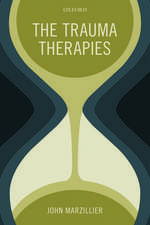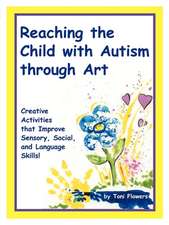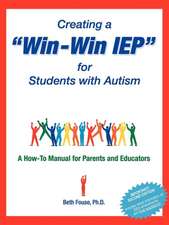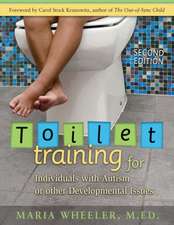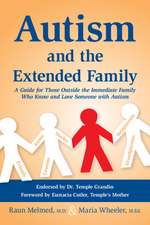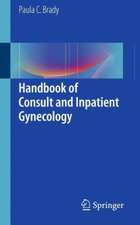A Treasure Chest of Behavioral Strategies for Individuals with Autism
Autor Beth Fouse, Maria Wheeleren Limba Engleză Paperback – 31 dec 1996
A cornucopia of ideas, strategies, and concepts that will apply to virtually any situation! The authors address sensory, communication, and physical and social-emotional issues by increasing desired behaviors and decreasing unwanted behaviors. You will also learn how to build "sensory diets" into everyday activities; use antecedent control; teach students to self-regulate; deal with self-injurious behaviors, physical or verbal aggression, toilet training, obsessive-compulsive behavior, and fixations; deal with crisis/stress/data management, data management, and much more. Whatever problems you face, you'll find helpful solutions to them in this book. This book should be on every teacher's and parent's bookshelf. Great reference source!
Helpful sections include:
- Impact of Autism Characteristics
- What Does Communication Have to do With Behavior?
- Sensory Issues and Behavior
- Social Skills and Social/Emotional Issues
- Structuring the Environment for Success
- Increasing Desired Behaviors
- Decreasing Unwanted Behaviors
- Crisis Management and Other Special Problems
- Discipline Procedures and Behavior Intervention Plans
- Stress Management
Preț: 239.48 lei
Preț vechi: 252.08 lei
-5% Nou
Puncte Express: 359
Preț estimativ în valută:
45.83€ • 49.00$ • 38.21£
45.83€ • 49.00$ • 38.21£
Carte disponibilă
Livrare economică 27 martie-10 aprilie
Preluare comenzi: 021 569.72.76
Specificații
ISBN-13: 9781885477361
ISBN-10: 1885477368
Pagini: 448
Dimensiuni: 217 x 277 x 22 mm
Greutate: 1.03 kg
Editura: FUTURE HORIZONS
ISBN-10: 1885477368
Pagini: 448
Dimensiuni: 217 x 277 x 22 mm
Greutate: 1.03 kg
Editura: FUTURE HORIZONS
Cuprins
I. Impact of Autism Characteristics
A. Critical Characteristics Impacting Behavior
B. Impact on Home Environment
C. Impact on School Environment
II. What Does Communication Have to do With Behavior?
A. Communication Characteristics
B. Suggestions for Addressing Behavior Through Effective Communication Programs
C. Alternative Communication
D. Assistive Technology and Communication
E. Sign Language
F. Facilitated Communication
III. Sensory Issues and Behavior
A. Alertness
B. Hypersensitivities
C. Hyposensitivities
D. Dysfunctions in Specific Sensory Systems
E. Interventions for Sensory Issues
IV. Physiological Needs That May Impact Behavior
A. Medical
B. Medication Issues
C. Diets and Allergies
D. Vitamin Therapy
V. Social Skills and Social/Emotional Issues
A. Characteristics
B. Social Skills Training
C. Social Stories
D. Social Review
E. Comic Strip Conversations
F. Books
G. Peer Assisted Interventions
VI. Structuring the Environment for Success
A. Physical Environment
B. Routines and Rituals
C. Visual Cues
D. Schedules
E. Include a Sensory Diet
VII. Increasing Desired Behaviors
A. Functional Analysis
B. Antecedent Control
C. Self-regulation
D. Guidelines for Setting Up and Using a “Safe" Area
E. Using Consequences to Change Behaviors
F. Reinforcement
1. Reinforcer Assessments
2. Positive Reinforcement
3. Sensory Reinforcers
4. Social Reinforcers
5. Activity Reinforcers
6. Tangible Reinforcers
7. Token Systems
8. Negative Reinforcement
G. Developing New Behaviors
1. Task Analysis and Chaining
2. Backward Chaining
3. Successive Approximation
H. Compliance Training
1. Effective Cues
2. Three-step Prompting
3. Speak and Spin
4. Lovaas and Other Compliance Training Programs
VIII. Decreasing Unwanted Behaviors
A. Punishment Versus Negative Consequences
B. Ignoring Misbehavior
C. Differential Reinforcement
D. Behavioral Momentum
E. Time-Out
1. TOOTS
2. Contingent Observation
3. Isolated Time-Out
4. Exclusionary Time-Out
5. Delayed Time Loss
F. Response Cost
IX. Crisis Management and Other Special Problems
A. Early Warning Signs
B. Managing Meltdowns or Catastrophic Reactions
C. Aggression
1. Verbal Aggression
2. Physical Aggression
3. Self-injurious Behavior
D. Temper Tantrums
E. Self-stimulatory Behaviors
F. Running Away
G. Dramatic Exits
H. Safety Issues
I. Pica
J. Climbing
K. Other Special Problems
1. Feeding Issues
2. Stripping and Disrobing
3. Masturbation
4. Toilet Training
5. Sleep Problems
6. Obsessions and Compulsions
7. Fixations
X. Discipline Procedures and Behavior Intervention Plans
A. 1997 Amendments to IDEA
B. Behavior Intervention Plans
C. Common Mistakes Made by School Districts
D. Level Systems
XI. Putting It All Together
A. Observations
B. Behavior Descriptions
C. Measuring Progress
D. Reporting Information
E. Program Changes
F. Generalization Training
G. Fading Intervention
XII. Stress Management
XIII. Final Gems
Appendices
A. Behavior Intervention Plans
B. Data Collection Forms
C. Resources
Glossary
References
A. Critical Characteristics Impacting Behavior
B. Impact on Home Environment
C. Impact on School Environment
II. What Does Communication Have to do With Behavior?
A. Communication Characteristics
B. Suggestions for Addressing Behavior Through Effective Communication Programs
C. Alternative Communication
D. Assistive Technology and Communication
E. Sign Language
F. Facilitated Communication
III. Sensory Issues and Behavior
A. Alertness
B. Hypersensitivities
C. Hyposensitivities
D. Dysfunctions in Specific Sensory Systems
E. Interventions for Sensory Issues
IV. Physiological Needs That May Impact Behavior
A. Medical
B. Medication Issues
C. Diets and Allergies
D. Vitamin Therapy
V. Social Skills and Social/Emotional Issues
A. Characteristics
B. Social Skills Training
C. Social Stories
D. Social Review
E. Comic Strip Conversations
F. Books
G. Peer Assisted Interventions
VI. Structuring the Environment for Success
A. Physical Environment
B. Routines and Rituals
C. Visual Cues
D. Schedules
E. Include a Sensory Diet
VII. Increasing Desired Behaviors
A. Functional Analysis
B. Antecedent Control
C. Self-regulation
D. Guidelines for Setting Up and Using a “Safe" Area
E. Using Consequences to Change Behaviors
F. Reinforcement
1. Reinforcer Assessments
2. Positive Reinforcement
3. Sensory Reinforcers
4. Social Reinforcers
5. Activity Reinforcers
6. Tangible Reinforcers
7. Token Systems
8. Negative Reinforcement
G. Developing New Behaviors
1. Task Analysis and Chaining
2. Backward Chaining
3. Successive Approximation
H. Compliance Training
1. Effective Cues
2. Three-step Prompting
3. Speak and Spin
4. Lovaas and Other Compliance Training Programs
VIII. Decreasing Unwanted Behaviors
A. Punishment Versus Negative Consequences
B. Ignoring Misbehavior
C. Differential Reinforcement
D. Behavioral Momentum
E. Time-Out
1. TOOTS
2. Contingent Observation
3. Isolated Time-Out
4. Exclusionary Time-Out
5. Delayed Time Loss
F. Response Cost
IX. Crisis Management and Other Special Problems
A. Early Warning Signs
B. Managing Meltdowns or Catastrophic Reactions
C. Aggression
1. Verbal Aggression
2. Physical Aggression
3. Self-injurious Behavior
D. Temper Tantrums
E. Self-stimulatory Behaviors
F. Running Away
G. Dramatic Exits
H. Safety Issues
I. Pica
J. Climbing
K. Other Special Problems
1. Feeding Issues
2. Stripping and Disrobing
3. Masturbation
4. Toilet Training
5. Sleep Problems
6. Obsessions and Compulsions
7. Fixations
X. Discipline Procedures and Behavior Intervention Plans
A. 1997 Amendments to IDEA
B. Behavior Intervention Plans
C. Common Mistakes Made by School Districts
D. Level Systems
XI. Putting It All Together
A. Observations
B. Behavior Descriptions
C. Measuring Progress
D. Reporting Information
E. Program Changes
F. Generalization Training
G. Fading Intervention
XII. Stress Management
XIII. Final Gems
Appendices
A. Behavior Intervention Plans
B. Data Collection Forms
C. Resources
Glossary
References
Recenzii
“At long last! A book on behavior strategies that was comprehensive, easy to understand and easy to use. Thank you Beth and Maria!"
Special Education Teacher
Special Education Teacher
“I’ve already tried some of your behavior strategies—and they worked! Thanks for such a useful book."
Parent of a child with PDD
Parent of a child with PDD
“Loved the Case Examples—they really helped me understand the intervention strategies. Now I can help my students more effectively."
Special Education Teacher
Special Education Teacher
Notă biografică
Beth Fouse, Ph.D., is an Associate Professor in the Department of Special Services, School of Education and Psychology, at The University of Texas at Tyler. She has over twenty years experience in the public schools as a classroom teacher and administrator. Beth currently teaches courses in gifted education and special education in various disability areas including autism, communication disorders and behavioral disorders. She is a certified instructor in Nonviolent Crises Intervention and has been certified by Dr. Guy Berard as an auditory integration practitioner. Beth works one day per week with a special education cooperative providing family training, school/home liaison services, classroom consultation for teachers of students with autism and other behavioral disorders. She also provides in-service training for other school districts and educational agencies in the northeast Texas area.
Maria Wheeler, M.Ed., has spent more than twenty years of her professional life in the fields of Psychology and Special Education, with an emphasis on Neurobehavioral Disorders, Applied Behavior Analysis, and Specific Learning Disabilities. She has held positions in Florida and Texas as a special education classroom teacher, behavior specialist, and director of behavioral services for residential treatment centers serving adults and children with neurobehavioral disorders and developmental disabilities. She currently holds Texas teacher certificates/endorsements in Serious Emotional Disturbance and Autism, Special Education, and Psychology. Maria works as a private consultant serving various school districts, educational agencies, and families throughout Texas.
Maria Wheeler, M.Ed., has spent more than twenty years of her professional life in the fields of Psychology and Special Education, with an emphasis on Neurobehavioral Disorders, Applied Behavior Analysis, and Specific Learning Disabilities. She has held positions in Florida and Texas as a special education classroom teacher, behavior specialist, and director of behavioral services for residential treatment centers serving adults and children with neurobehavioral disorders and developmental disabilities. She currently holds Texas teacher certificates/endorsements in Serious Emotional Disturbance and Autism, Special Education, and Psychology. Maria works as a private consultant serving various school districts, educational agencies, and families throughout Texas.

